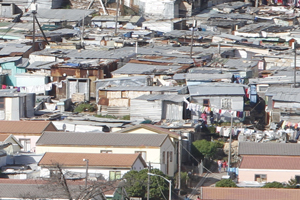Research Brief
Decentralization in South Africa
The Role of Politics
In the WIDER Working Paper ‘Vertical Decentralization and Urban Service Delivery in South Africa: Does Politics Matter?’ Robert Cameron looks at the ways in which politics affects decentralization and service delivery in South Africa. To do this he looks at Cape Town, which is controlled by the opposition Democratic Alliance (DA), and Johannesburg, which is controlled by the ruling African National Congress (ANC). He finds that while politics does play a role, decentralization has been institutionalized in South Africa and opposition politics does not prevent the Cape Town government from delivering services to their constituency.
Ruling party interference and decentralization
The global trend towards decentralization to local governments is less prevalent in Africa where many countries still tend towards centralized control. South Africa, with instituted decentralization to both the provincial and local levels, is an exception to this rule. However there is always the potential for party politics to play a role when the party in power nationally loses control of local governments, a situation of so called ‘vertically divided political authority’. Cameron suggests that South Africa is no exception in this regard.
The ANC government, Cameron argues, has attempted to undermine political decentralization and the diffusion of power from the central government in a number of ways. For instance, in the last two local elections the ANC did not announce its mayoral candidates. This led to a situation where people were forced to vote for the party, without knowing who would possibly be their mayor if the ANC won, completely undermining the ability of local constituents to directly hold their representatives accountable.
Inter-party conflict has also limited the political decentralization project. As an example of this Cameron points to the enactment, by the ANC government, of legislation allowing councillors to switch parties which benefited them more than any other party. Similarly when the ANC took control of the Western Cape provincial government, it amended legislation so that municipalities could decide whether to operate under a mayoral executive system, or one based around an collective executive system. This enabled the ANC councillors in Cape Town to vote for get rid of the collective executive systeml, on which the DA had some seats, and switch to mayoral system with an advisory committee made up fully of ANC members. Clearly a change in legislation by the provisional ANC government enabled the local ANC party to extend its control in Cape Town

When it comes to urban service delivery the area most affected by vertically divided governance is housing. The problems stem from the fact that responsibility for housing is shared between national, provincial, and municipal governments. Consequently, Cameron suggests, housing has become something of a party political football. Perhaps the most notable example of this is removal of Cape Town municipality from a major intergovernmental housing programme in Cape Town just after the DA had taken over from the ANC as the majority party in the local government. Clearly this was to some extent politically motivated, however Cameron points out that the housing sector is the exception rather than the rule. In many other areas of service delivery there has typically been strong cooperation between local and central government even when such cooperation has involved opposition parties.
Strong financial decentralization
Cameron suggests that despite the numerous attempts the ANC has made to limit and change the terms of the political decentralization, financial decentralization, in terms of how funds are disbursed from central to local government, remains strong. This is partly because South Africa’s large cities are mainly self-financing. In fact Johannesburg relies on grants for only fifteen per cent of its budget, and Cape Town for just eight per cent. Consequently major cities in South Africa can by and large make their own spending decisions.
However there are some concerns about political manipulation of the equitable share of funding each city is constitutionally guaranteed. Cape Town has roughly the same population as Johannesburg but receives R1 billion less as an unconditional grant. This is explained by the fact that the share is based on a 2001 census and Cape Town’s own rapid growth. However while the disparity in funding cannot be proven to be politically motivated, the deputy mayor of Cape Town has said that he feels the city is being short changed.
Perhaps surprisingly party political considerations appear to play less of a role when it comes to conditional grants. Conventional wisdom is that unconditional grants are more conducive to decentralization as they allow local governments to set their own spending priorities, whereas conditional grants allow the central government to exert control over how the money is spent. However conditional grants in South Africa appear to be working well with decentralization. For example Cape Town was chosen for a transport pilot project because of its reputation of being a well-run city that can fulfil its obligations. The fact that negotiations about grants often take place between fellow technical experts rather than politicians also plays a role in preventing interference with party political motivations.
Decentralization and ODA
South Africa’s national guidelines on ODA are made up of two core principles. First, all levels of government have the right to attract, plan, and use ODA. Second, ODA must be aligned to national strategic priorities. Essentially the national government retains overall responsibility for ODA, but provincial and local governments can establish their own ODA policies provided they fit within the national policy framework.
These guidelines provide donors with a fairly high degree of discretion when it comes to deciding how to deliver aid. The central government does not act as a gatekeeper, and donors are able to negotiate with municipalities directly. Donors have dealt with this freedom in different ways. For example Danida makes sure that it works with both ANC and DA controlled cities, whereas the German donor agency KfW is happy to work only with DA controlled Cape Town because they know the city can meet its obligations.
Cameron concludes by suggesting that, in contrast to many African countries, decentralization in South Africa is strong. While the national government has made some attempts to recentralize power the strong constitutional framework and financial decentralization mean that South African cities have maintained a large degree of independence. This decentralization also means that donors are able to deliver aid in a way that ensures cities are not disadvantaged due to their political opposition.

 Join the network
Join the network